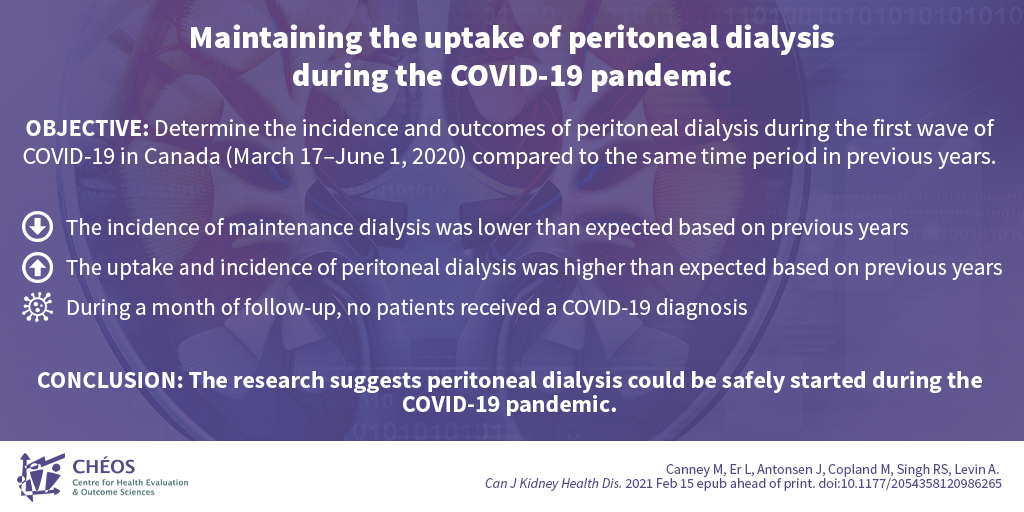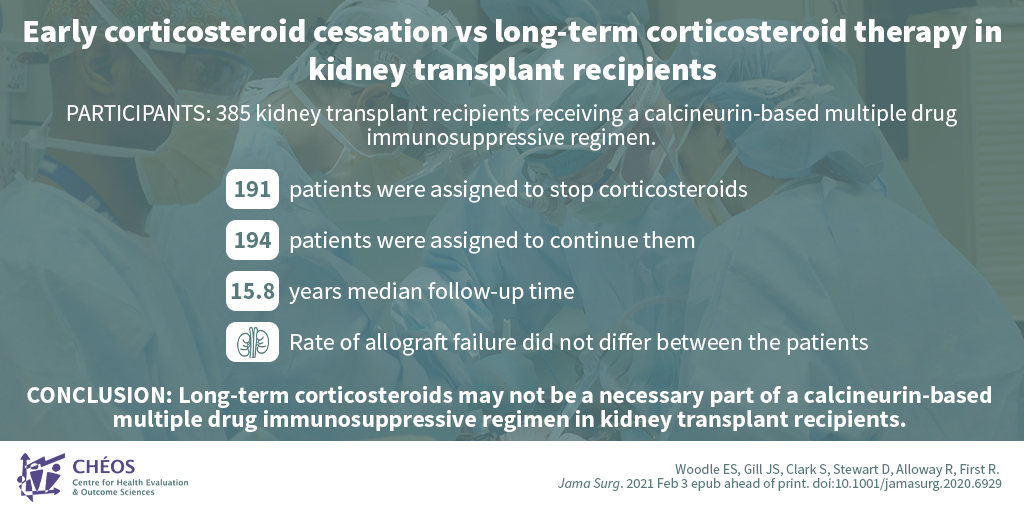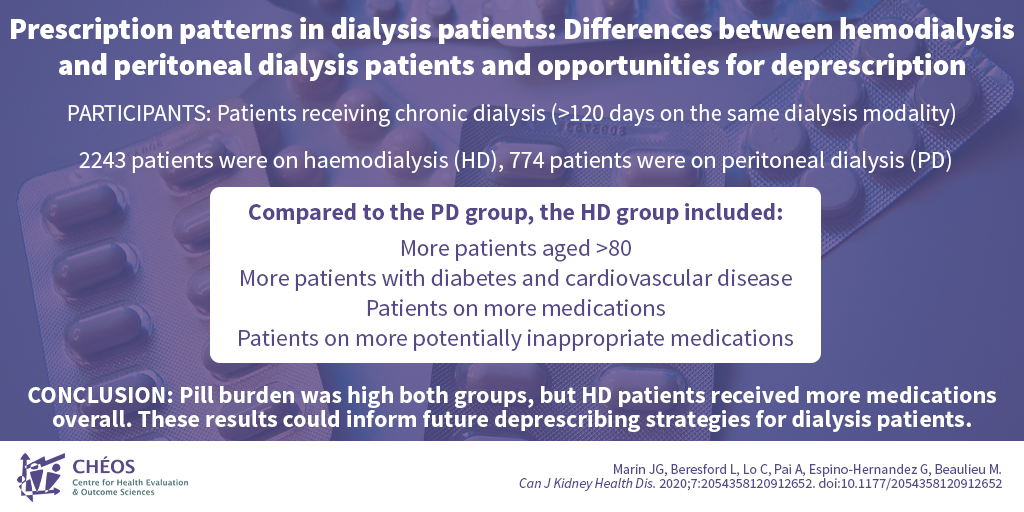The Evidence Speaks Series is a recurring feature highlighting the latest in CHÉOS research. This series features summaries of select publications and is designed to keep media and the research community up-to-date with CHÉOS’ current research results in the health outcomes field. In recognition of Kidney Health Month, this edition focuses on nephrology-related research.
To ensure this research is quick and easy to share, we are now providing social cards that you are free to save and use as you see fit.
Research suggests peritoneal dialysis can be safely started during the pandemic
Canney M, Er L, Antonsen J, Copland M, Singh RS, Levin A. Maintaining the Uptake of Peritoneal Dialysis During the COVID-19 Pandemic: A Research Letter. Can J Kidney Health Dis. 2021 Feb 15 epub ahead of print.
CHÉOS Scientist Dr. Adeera Levin and colleagues from BC Renal and UBC examined the incidence and outcomes of peritoneal dialysis during the first wave of COVID-19 in Canada (March 17–June 1, 2020) compared to the same time period in previous years. A total of 211 patients started maintenance dialysis during that time, which was lower than expected based on previous years (41.3 per million population [pmp] versus 45.7 pmp). However, the uptake and incidence of peritoneal dialysis, a treatment that uses the stomach’s abdominal lining to filter the blood, was a higher than expected based on previous years (18.2 pmp versus 16.3 pmp). During a month of follow-up, no patients were diagnosed with COVID-19. The research indicates that peritoneal dialysis can be safely started during the pandemic.

How necessary are long-term corticosteroids after kidney transplant?
Woodle ES, Gill JS, Clark S, Stewart D, Alloway R, First R. Early Corticosteroid Cessation vs Long-term Corticosteroid Therapy in Kidney Transplant Recipients: Long-term Outcomes of a Randomized Clinical Trial. Jama Surg. 2021 Feb 3 epub ahead of print.
The adverse effects of corticosteroids have led to attempts to remove them from treatment regimens; however, stopping corticosteroids following kidney transplant is associated with increased risk of short-term rejection. The long-term outcomes of transplant patients withdrawn from corticosteroid treatment remains inconclusive. A group of researchers from North America, including CHÉOS Scientist Dr. John Gill, compared long-term kidney transplant outcomes of patients receiving a calcineurin-based multiple drug immunosuppressive regimen (a common regimen used to prevent rejection) who were randomized to continue or stop taking corticosteroids. The study included 385 patients; 191 were assigned to stop corticosteroids and 194 were assigned to continue them. During the follow-up period, there were no apparent differences between the two patient groups in terms of failure of the transplanted organ. The researchers determined that long-term corticosteroids may not be a necessary part of a calcineurin-based multiple drug immunosuppressive regimen for kidney transplant recipients.

Informing future deprescribing strategies for dialysis patients
Marin JG, Beresford L, Lo C, Pai A, Espino-Hernandez G, Beaulieu M. Prescription Patterns in Dialysis Patients: Differences Between Hemodialysis and Peritoneal Dialysis Patients and Opportunities for Deprescription. Can J Kidney Health Dis. 2020 May 1;7:2054358120912652.
CHÉOS Scientist Dr. Monica Beaulieu joined investigators from UBC to review prescribing patterns for patients on maintenance dialysis to see if there were any differences between haemodialysis (HD) and peritoneal dialysis (PD). A total of 3017 patients were included in the study, 2243 of whom were on HD and 774 were on PD. Old age, diabetes, and cardiovascular disease were more prevalent in the HD group, plus HD patients were on more medications than PD patients. Although present in both groups, more prescribed medications were classed as ‘potentially inappropriate’ in the HD group. Overall, this study indicates that while pill burden is high in both groups, more medications overall are received by HD patients. These results could help inform future deprescription strategies for patients on maintenance dialysis.

At a glance…
Below, you can view, save, and use social cards for additional recent publications from CHÉOS Scientists.
CHÉOS Scientist Dr. Naveed Janjua et al.
Tracking COVID-19 discourse on Twitter in North America: Topic modeling and aspect-based sentiment analysis
Click here to view
CHÉOS Statistician Monica Norena et al.
Does community size or commute time affect severity of illness at diagnosis or quality of care in a centralized care model of pulmonary hypertension?
Click here to view
CHÉOS Scientist Dr. Daniel Vigo et al.
Investigating the effect of COVID-19 dissemination on symptoms of anxiety and depression among university students
Click here to view



